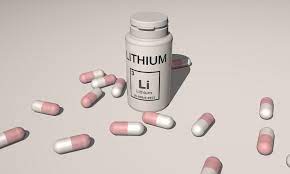Lithium therapy is used to treat bipolar disorder and other mental health problems. As a nursing student, understanding the proper administration, interactions, and patient education related to this medication is crucial to providing effective and safe patient care. This article will provide a comprehensive guide on this therapy including its importance for mental health management, administration, interactions, patient education, nursing considerations, ethics, and legal considerations.(Lithium therapy essay)
Lithium therapy essay
I. Introduction
Lithium therapy is a mood-stabilizing drug that treats bipolar disorder, major depressive disorder, and schizophrenia, among other mental health problems. It is one of the best ways to treat bipolar disorder because it helps to control mood swings, lowers the chance of relapse, and improves mental health in general.(Lithium therapy essay)

II. Understanding Bipolar Disorder
Bipolar disorder is a mental health condition that causes extreme mood swings, including manic and depressive episodes. Manic episodes consist of high energy, reduced sleep, and euphoria or grandiosity. On the other hand, having little energy, feeling sad, and not wanting to do anything, marks depressive episodes.(Lithium therapy essay)
Lithium therapy can help manage bipolar disorder by stabilizing mood swings and reducing the frequency and severity of manic and depressive episodes. Lithium therapy also effectively reduces the risk of suicide, a common complication of bipolar disorder.
III. Lithium Therapy Administration
Proper administration is crucial to ensure its effectiveness and safety for patients. Nurses should begin the treatment with lithium at a low dose and slowly increase it until they reach the specified lithium levels.(Lithium therapy essay)
Nurses should also tell patients how important it is to keep an eye out for side effects and tell their doctor about any changes in mood, behavior, or physical symptoms. In addition, they should inform patients about the importance of follow-up care and regular monitoring of lithium levels.
VI. Nursing Considerations
Nurses play a crucial role in lithium therapy management. In this case, they should check on their patients and keep an eye out for any negative reactions or changes in their mood, behavior, or physical symptoms. Nurses should also work with other medical professionals, like psychiatrists and pharmacists, to make sure that patients get the best care possible.
Also, nurses should teach patients about lithium therapy, including how to take it, how to watch for side effects, and how to get care afterward. Nurses should also keep an eye on patients’ lithium levels and change their doses as needed to make sure they get the right amount of lithium therapy.(Lithium therapy essay)
VII. Ethics and Legal Considerations
When giving lithium therapy, it is important from an ethical point of view to make sure that the patient knows all of the risks and benefits, including the possibility of side effects and drug interactions. Nurses should also ensure that they fully inform the patients about alternative treatments and have the right to refuse lithium therapy.(Lithium therapy essay)
Legal considerations related to lithium therapy include the proper administration and documentation of medication administration. Specifically, it includes accurate dosage calculation and monitoring of lithium levels. Nurses should also make sure that patients know their rights. Moreover, they should follow the HIPAA rules to protect their privacy.(Lithium therapy essay)
VIII. Conclusion
Lithium Therapy is a crucial medication for managing various mental health conditions, including bipolar disorder. As a nursing student, understanding the proper administration, interactions, and patient education is crucial in providing effective and safe patient care. By following the guidelines outlined in this article, nursing students can provide high-quality care to patients receiving treatment. As a result, they can ensure that the patients receive the best possible outcomes for their mental health management.(Lithium therapy essay)
IX. FAQs
What is lithium therapy?
- It is a mood-stabilizing medication for various mental health conditions, including bipolar disorder.
How does lithium therapy work?
- It stabilizes mood swings and reduces the frequency and severity of manic and depressive episodes.
What are the common adverse reactions to lithium therapy?
- Common adverse reactions include nausea, vomiting, diarrhea, tremors, and confusion.
What medications interact with lithium therapy?
- Medications that interact with this therapy include diuretics, NSAIDs, ACE inhibitors, and antipsychotics.
How is lithium therapy dosed and monitored?
- Lithium Therapy is typically started at a low dose and gradually increased until the desired therapeutic level is reached. Nurses should monitor Serum Lithium levels regularly. This strategy ensures that patients receive the correct dosage and that the therapeutic level is maintained.
A Page will cost you $12, however, this varies with your deadline.
We have a team of expert nursing writers ready to help with your nursing assignments. They will save you time, and improve your grades.
Whatever your goals are, expect plagiarism-free works, on-time delivery, and 24/7 support from us.
Here is your 15% off to get started.
Simply:
- Place your order (Place Order)
- Click on Enter Promo Code after adding your instructions
- Insert your code – Get20
All the Best,
Cathy, CS


